Fantasy role-playing series Dragon Age has garnered a dedicated base of fans with its lore-heavy storytelling and memorable characters. The debut of 2009's Dragon Age: Origins was a very well-received beginning to what would become BioWare's flagship fantasy tale. While sequel Dragon Age II was met with a somewhat-positive response, it did not quite live up to the standard set by its predecessor.
The newest entry into main series, Dragon Age: Inquisition, launches this month. Powered by a new engine and the promise to incorporate players' past choices into a story framed by a vast new world to explore, the game has some rather high expectations to meet. I sat down with BioWare creative director Mike Laidlaw to discuss what fans can expect from stepping into the shoes of the Inquisitor, character relationships, and the future of the series.
Fallout 4 Next Gen Update Comparison Stellar Blade - Hard Mode No Damage Gigas Boss Gameplay Stellar Blade - Hard Mode No Damage Abaddon Boss Gameplay Stellar Blade - (Almost) All Outfits Granblue Fantasy: Relink - New Content Trailer Modern Warfare III - New Season 3 Reloaded Modern Warfare Zombies Update River City Girls 2 - New Playable Characters DLC Reveal!! That Time I Got Reincarnated as a Slime ISEKAI Chronicles – Official Announcement Trailer MEGATON MUSASHI W: WIRED – Official OP “MUSASHI English Ver.” Trailer Gothic 1 Remake | Official Collector's Edition Trailer SaGa Emerald Beyond – Official Launch Trailer Paper Mario: The Thousand-Year Door – Official Switch Overview Trailer
Please enter your date of birth to view this video
By clicking 'enter', you agree to GameSpot's
Terms of Use and Privacy Policy
Dragon Age: Inquisition places players in the role of the leader of the Inquisition, an organization formed with the purpose of defending the nation of Thedas against peril. As such, it is the responsibility of this leader to deploy troops and agents to the battlefield. Curious how in-depth this strategic gameplay would reach, I asked Laidlaw whether this element of the game would require players to be familiar with tactical planning. Would players who were less than familiar with commanding troops in war be penalized?
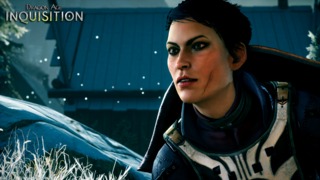
"We set down as a rule, let's not turn it into moving pieces around," Laidlaw said in response. "Instead, what we wanted to go back to was the feel of a leader and a commander who generally doesn't have to specifically layout troop movements...you have specialists who handle that. We thought it would be a much more satisfying way to treat it like it was almost a story beat. What they're looking from you is direction. They can handle it, they can take care of the details, but they want to know how you would approach this."
In a non-spoiler example he provided, a group of refugees take up residence on a lord's land. The lord will approach the Inquisition with a request to have the refugees removed from his property. Players consulting with the diplomat will have her encourage them to talk to the local bands and find a new location for them. Speaking to the spies will reveal the option to have them removed. If the commander is asked, he will offer to help the band because he finds the lord is "a bit of a jerk." Here, Dragon Age: Inquisition will offer a variety of paths to take in decision-making, with results ultimately emphasised through consequences that may surface further down the path.
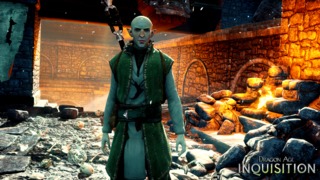
"We've tried to make them more about leadership choices, leadership style, and more about reactivity to choices you make throughout the game. A lot of those operations appear in response to you having made an ally, or you having done this major thing and suddenly people are reaching out to you because they've heard about it," he said. I wondered if the conflict in that scenario would continue, regardless of whether the player chose to intervene or realign their focus on the main story. Would this area remain in a perpetual state of pause until the player chose to address it?
"It really depends on the conflict. In the case of that one, it would eventually go away. It takes a very long time, it's not on a timer or anything. A major story event would probably wipe it out at one point. But the world is fairly chaotic, it's a rough time. We don't want to penalize the player and say these things are going to go away in the sphere of time. However, stabilizing the world fundamentally feeds back into the story."
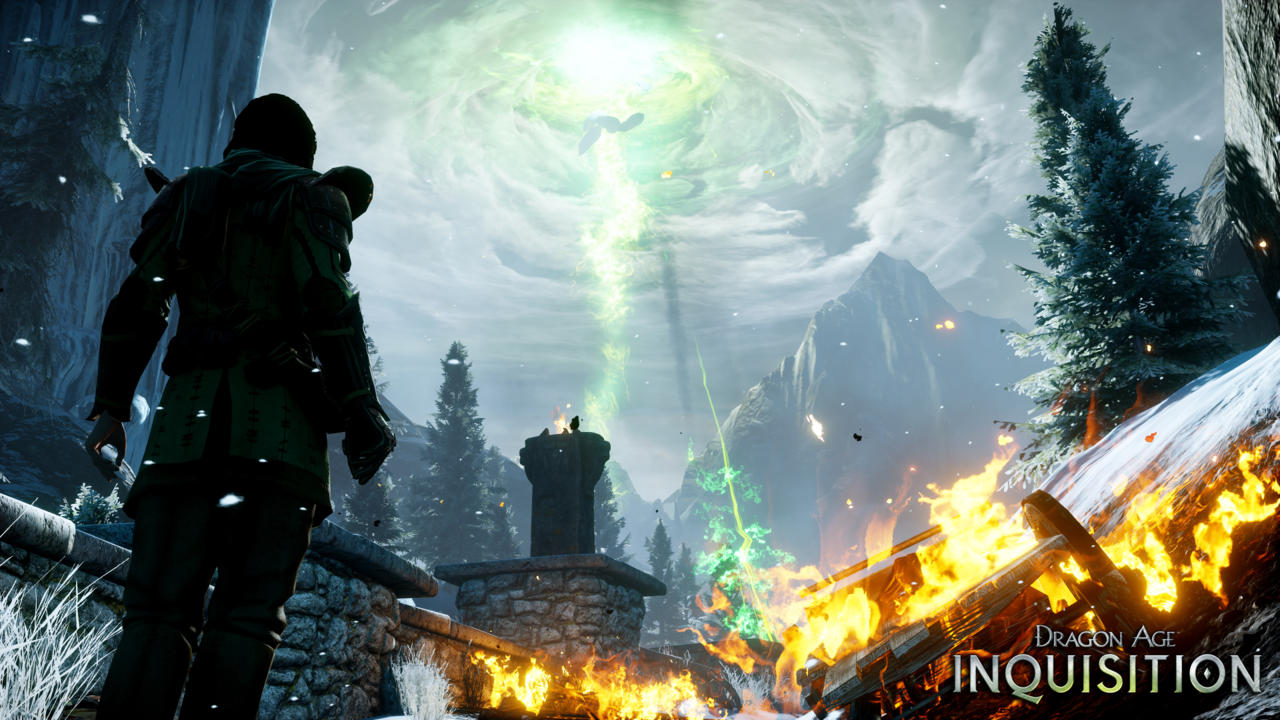
According to Laidlaw, should players do the opposite and focus on side-quests instead of the main game, the core story would remain on hold.
"The nice thing about the nature of the game we built is that the Inquisition is essentially turning over rocks. They're investigating, they're finding the source of the chaos that's affecting the world. Because it's so entrenched, it's so hidden, it's not as immediate as 'there's an army coming over this hill, but don't worry I'm going to rescue this kitten instead.' What we've tried to do was make rescuing the kitten instead, [the player] should be doing something that helps the Inquisition. You don't necessarily have an immediate threat, but you have an immediate goal. The nice thing that balances that out is that at the beginning of the game, you can't go everywhere available. It's not like you're going to be like, excuse me for 200 hours while I make no progress at all. Instead, as you advance through the story it opens up new areas for you to visit."

While I enjoyed Dragon Age II, it did not impact me with the same sense of wonder and awe that Dragon Age: Origins did. I asked Laidlaw if he felt that Inquisition was closer in nature to one of those two games than the other.
"It's closer to Origins in overall feel. It's bigger, it's bolder. It plays slower than [Dragon Age 2]. That said, there were some things for DA2 that I felt were very powerful. The characters I felt did a better job of having their own stories or agendas. So we held on to a lot of that. We wanted to make sure they had their own arcs, whether you were romancing them or just friends. The other big thing that we kept from DA2 is that combat in general feels responsive. I think DA2 was very successful in making you feel like oh, I tagged that guy and moved in, I punched him in the face. Some people would get annoyed because they thought I was dismissing Origins, but when your character took a long time to shuffle into position it was like, 'you're a trained warrior, you can do better.'"
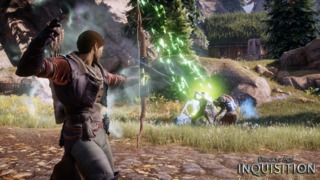
Combat in Dragon Age: Inquisition has been touted by BioWare as "more challenging" than that of the previous games. When pressed for specific examples, Laidlaw explained, "there are two big changes in terms of enemy opposition; there was much stuff with balance and they're tougher, and we don't have waves of dudes that explode in one hit. Enemy factions like the Red Templars, the Venatori, these enemies typically will work together quite effectively. The guardsmen with their large shields, generally if they're not in immediate combat they will try to place themselves so that your shots at the mages behind them will be deflected. Enemy assassins or other stealthy characters will actively hunt out your mages and rogues, your back rank characters."
Fighting the dragons will also be different to that of previous Dragon Age games, with players able to target the the legs and head of dragons individually. The properties of each dragon's breath will also come into play, interacting with environments.
"The way we developed them, we built the bases, and we had a team of level designers, and the creature guys, and the animators, and the visual effects guys, all of them would come in and play each dragon. They'd pick one dragon per day and it was about a two to three week cycle for them to go through them all. Then they'd go and make improvements, like making it so that his lightning breath electrifies the water."
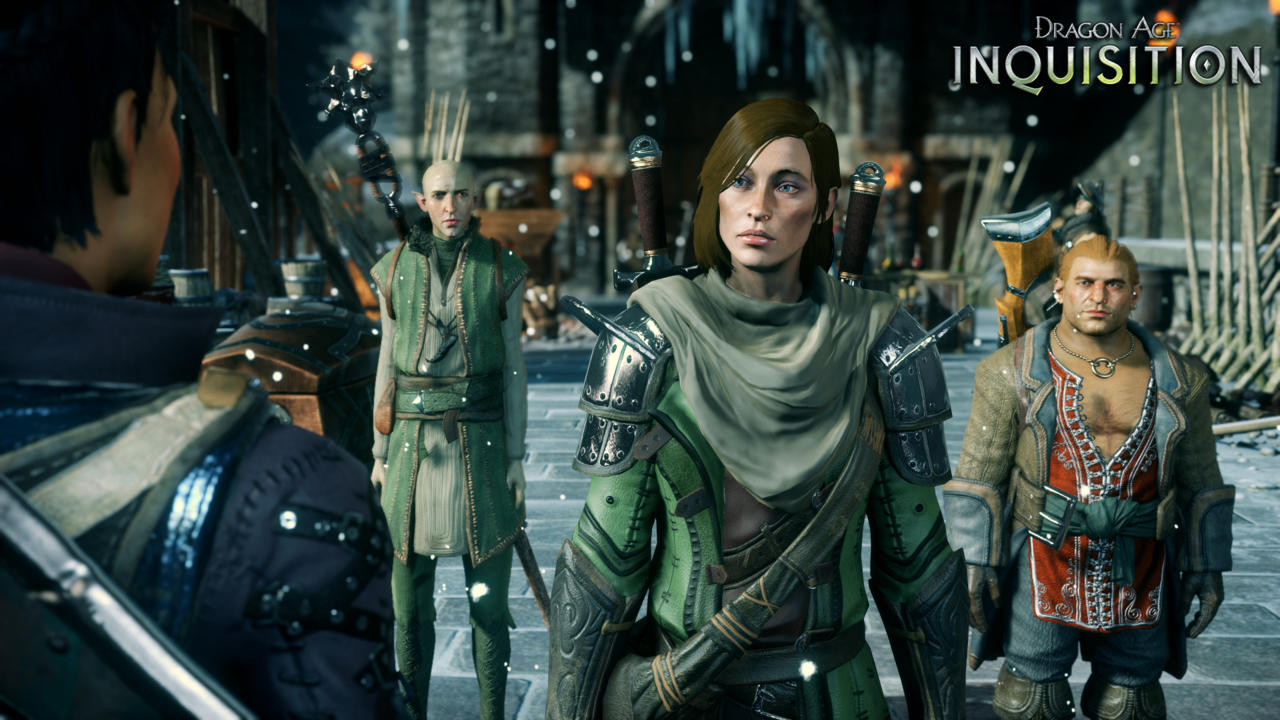
But battles on this scale cannot be fought alone, and Dragon Age: Inquisition sports over "a small novel's worth" of banter between characters in the party. Interaction shared between characters brought a new sense of depth to the characters who populated the Dragon Age world, where I felt that their relationships with each would persist and progress without my presence.
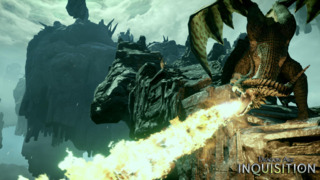
"Obviously you see 100% of your relationships, but it's nice to have these narratives happening off on the side and some of them are conditional. If you did X and Y, that turns some of these back on." Laidlaw said. Players will be able to influence such relationships "to some degree" in Inquisition.
While BioWare has already stated that Inquisition is by no means concluding the Dragon Age series, the game "puts a few nails in quite a few coffins" and "introduces some new twists." For Laidlaw, the introduction of a multiplayer mode into the game is something he would like to continue exploring.
"I'm not sure if it's a perfect story situation, but it might be. I think it's something that's worth at least an investigation, especially based on reactions to the mode itself. I would say we've covered most of the South, I think we've covered the Chantry enough. But I do want to look more toward the North, I want to see what happens to nations like Tevinter, Rivaine, and do more with the Qunari. We're going to go with the same process we did with Inquisition, which was where we have a core story idea that starts to form and drive where we're heading next... the darkspawn, they're still nowhere resolved, there's still multiple arch-demons underground waiting to be woken up by them, there's still demons on the far side of the Veil. Nobody really knows what happened to the Elves. The Tevinter Imperium is still locked in a war with the Qunari. There's so much we could do."

